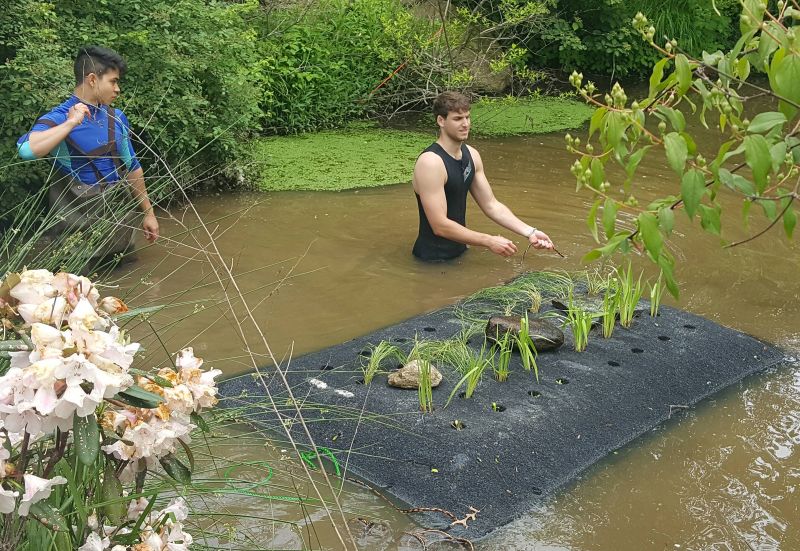Floating Wetlands to Clean Water Bodies in Indonesia
Published on by Water Network Research, Official research team of The Water Network in Technology
Two University of Rhode Island hydrologists are using floating wetlands made from a mat of buoyant material planted with native vegetation that will absorb nutrients, filter out particulates, and attract contaminants.
Many regions of Indonesia are struggling with how to clean up lakes and rivers that have become polluted with sewage or have had seawater intrude into them. So two University of Rhode Island hydrologists are adapting a new technology they believe will solve the problem.

URI students Ricardo Verissimo and Ehren Messinger install a floating wetland at a pond on the
Kingston campus to test its effectiveness at removing pollutants from the water.
(Photo by Soni Pradhanang)
URI Professor Thomas Boving and Assistant Professor Soni Pradhanang are testing the floating wetlands at a pond on the Kingston campus and collaborating with students at two universities in Indonesia to construct and install them.
“Floating wetlands have been around for a while, but it’s our idea to work with Indonesian universities and students to adapt them to local conditions,” said Boving, who has helped local villages improve water quality in India, Jordan, Kenya and other developing nations. “The challenge will be for the local students to find available materials, like recycled plastic bottles or plant materials, to form the basis of the floating device, and then identify the appropriate non-invasive plants for local conditions.”
Boving was invited last month to meet with the mayor of the city of Banjarmasin and its public works officials to demonstrate the technology in canals and other water bodies in the area.
A key element of the project will be measuring its success. Boving hopes the city will provide funding to measure bacteria, nutrients, heavy metals, pesticides and other pollutants before and after the project to determine if the floating wetlands have achieved their objective.
Read full article: URI Today
Media
Taxonomy
- Biological Treatment
- Biological Treatment
- River Studies
- Ecosystem Management
- Wetlands
- River Engineering
- Constructed Wetlands
- River Restoration